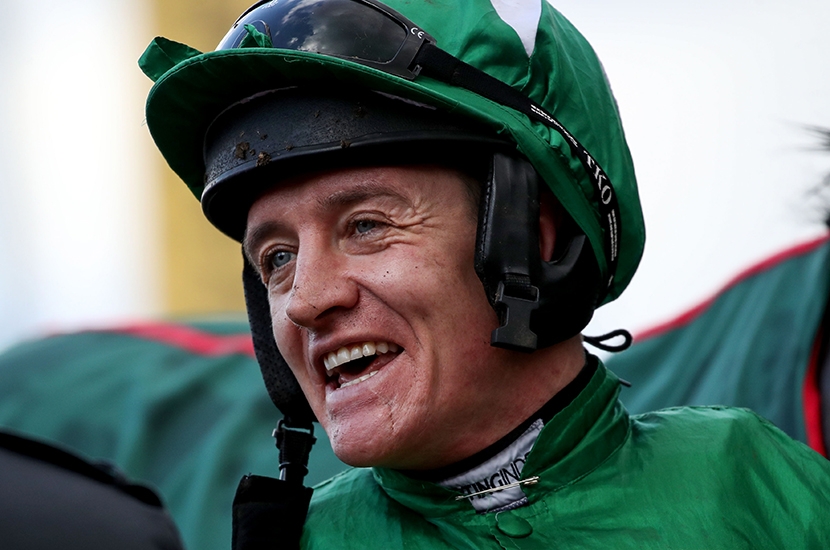When I first began racing, few jump jockeys reckoned their careers would last beyond the ages of 32 or 33. But they last longer these days.
Lying on the Aintree turf, though, after a fall in April last year, with his leg bent impossibly inwards, the 39-year-old Barry Geraghty wondered if that was where it was all going to end for him. (He has in the past few years broken both legs, both arms, fractured eight ribs and punctured a lung.) But that was only until the morphine kicked in. After six months of rehab for a broken fibula and tibia, he returned once more to the saddle and demonstrated with five glorious victories at the Cheltenham Festival in March that he was as good as ever. At the time he knew, although we didn’t, that at 40 it was going to be his last Festival and now he has announced his retirement. The first reaction must be delight that it is at a time of his own choosing. But his departure, after those of his fellow musketeers A.P. McCoy and Ruby Walsh, leaves a particularly big hole: listening to Barry Geraghty after a race always left me with a sneaking feeling that I had missed out by not being born Irish.
Revered by fellow practitioners for his strength in a finish, he had a marvellous light touch when out of the saddle. ‘Pressure is for tyres,’ as he once said before a big race. No wonder that Sigmund Freud allegedly labelled the Irish ‘the one race of people for whom psychoanalysis is of no use whatsoever’. Barry never seemed to take himself or the sometimes introverted and obsessive world of horseracing too seriously. Other top-flight riders such as Richard Dunwoody have confessed to beating themselves up and making life miserable for those close to them when their voracious thirst for more victories has been temporarily frustrated. Barry Geraghty’s view is that while winning is great losing is much easier to take if you’re not too keyed up about the whole game — or at least he manages to come across that way. He has charm in abundance. One Irish writer noted that racing’s female population gets very girly indeed when around him.
The debate about Barry Geraghty in the early days was whether he was, as the first trainer to nurture him, Noel Meade, once called him, ‘a cocky little bastard’ or whether it was simply a professional’s self-assurance that he was on top of the job. Trainer Jessie Harrington, for whom Moscow Flyer’s regaining of his Champion Chase crown under Geraghty in 2005, was particularly sweet, once talked of Barry’s ‘usual confident verging on cocky self’, then added that there was a fine line between the two: ‘People use hindsight to determine it: if the horse wins, you were full of confidence; if he gets beaten, then you were being cocky.’ Geraghty’s charm lets him get away with either. Typically, he declared in his early days: ‘I wouldn’t have seen any reason why I shouldn’t be [Ireland’s] champion jockey.’ At 20 he was. By the time he finished, he had ridden 1,920 winners. Only Ruby Walsh rode more than his 43 at the Cheltenham Festival and Geraghty’s 121 Grade One victories make him the only jockey other than Ruby to have more than a century of those.
What is not in dispute is Barry’s remarkable ability to transmit waves of his own irrepressible confidence down the reins to the animal beneath him. I remember seeing him do it with Riverside Theatre in the Ryanair Chase at the 2012 Festival. A mile out, most in the stands had assumed Geraghty’s mount had little further part to play. Up front McCoy was in full flow on Alberta’s Run but somehow Geraghty persuaded Riverside Theatre to keep finding a bit more to grind it out and snatch victory on the run-in.
He did it again with an astonishing last-gasp victory for Champ in the RSA at this year’s Festival and he did it more than once with Bobs Worth, the horse that Barry purchased as a foal and sold on at a small profit to a Nicky Henderson syndicate. Bobs Worth was a quiet sort of animal who never stood out on the gallops or looked prominent in a race but who was successful at three consecutive Cheltenham Festivals, culminating in his 2013 victory in the Gold Cup. Bobs Worth had looked done for well before the business end of the race but Barry somehow got him up to win.
No such cajoling, though, was needed in the Grand National of 2003 won by Monty’s Pass, trained by Ireland’s Jimmy Mangan. Barry, who won two Champion Hurdles on Buveur D’Air and another Gold Cup on Kicking King, as well as a Champion Chase on Sprinter Sacre, calls the National victory his favourite memory, recalling that he knew before the third-last that he was going to win. Monty’s Pass landed a massive Irish gamble but the memories of Geraghty’s career are just as warm this side of the Irish Channel. He was ours as well as theirs.






Comments